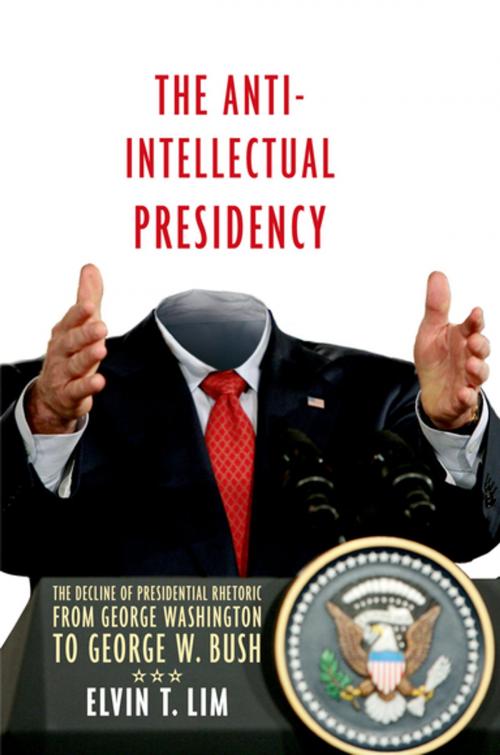The Anti-Intellectual Presidency
The Decline of Presidential Rhetoric from George Washington to George W. Bush
Nonfiction, Social & Cultural Studies, Political Science, Politics, History & Theory, Government, History, Americas, United States| Author: | Elvin T. Lim | ISBN: | 9780199927098 |
| Publisher: | Oxford University Press | Publication: | January 1, 2012 |
| Imprint: | Oxford University Press | Language: | English |
| Author: | Elvin T. Lim |
| ISBN: | 9780199927098 |
| Publisher: | Oxford University Press |
| Publication: | January 1, 2012 |
| Imprint: | Oxford University Press |
| Language: | English |
Why has it been so long since an American president has effectively and consistently presented well-crafted, intellectually substantive arguments to the American public? Why have presidential utterances fallen from the rousing speeches of Lincoln, Teddy Roosevelt, Wilson, and FDR to a series of robotic repetitions of talking points and sixty-second soundbites, largely designed to obfuscate rather than illuminate? In The Anti-Intellectual Presidency, Elvin Lim draws on interviews with more than 40 presidential speechwriters to investigate this relentless qualitative decline, over the course of 200 years, in our presidents' ability to communicate with the public. Lim argues that the ever-increasing pressure for presidents to manage public opinion and perception has created a "pathology of vacuous rhetoric and imagery" where gesture and appearance matter more than accomplishment and fact. Lim tracks the campaign to simplify presidential discourse through presidential and speechwriting decisions made from the Truman to the present administration, explaining how and why presidents have embraced anti-intellectualism and vague platitudes as a public relations strategy. Lim sees this anti-intellectual stance as a deliberate choice rather than a reflection of presidents' intellectual limitations. Only the smart, he suggests, know how to dumb down. The result, he shows, is a dangerous debasement of our political discourse and a quality of rhetoric which has been described, charitably, as "a linguistic struggle" and, perhaps more accurately, as "dogs barking idiotically through endless nights." Sharply written and incisively argued, The Anti-Intellectual Presidency sheds new light on the murky depths of presidential oratory, illuminating both the causes and consequences of this substantive impoverishment.
Why has it been so long since an American president has effectively and consistently presented well-crafted, intellectually substantive arguments to the American public? Why have presidential utterances fallen from the rousing speeches of Lincoln, Teddy Roosevelt, Wilson, and FDR to a series of robotic repetitions of talking points and sixty-second soundbites, largely designed to obfuscate rather than illuminate? In The Anti-Intellectual Presidency, Elvin Lim draws on interviews with more than 40 presidential speechwriters to investigate this relentless qualitative decline, over the course of 200 years, in our presidents' ability to communicate with the public. Lim argues that the ever-increasing pressure for presidents to manage public opinion and perception has created a "pathology of vacuous rhetoric and imagery" where gesture and appearance matter more than accomplishment and fact. Lim tracks the campaign to simplify presidential discourse through presidential and speechwriting decisions made from the Truman to the present administration, explaining how and why presidents have embraced anti-intellectualism and vague platitudes as a public relations strategy. Lim sees this anti-intellectual stance as a deliberate choice rather than a reflection of presidents' intellectual limitations. Only the smart, he suggests, know how to dumb down. The result, he shows, is a dangerous debasement of our political discourse and a quality of rhetoric which has been described, charitably, as "a linguistic struggle" and, perhaps more accurately, as "dogs barking idiotically through endless nights." Sharply written and incisively argued, The Anti-Intellectual Presidency sheds new light on the murky depths of presidential oratory, illuminating both the causes and consequences of this substantive impoverishment.















